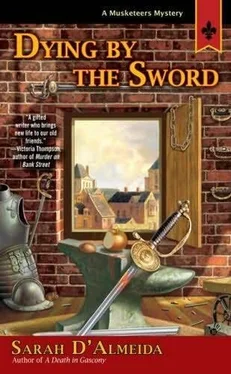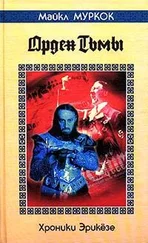Sarah D'Almeida - Dying by the Sword
Здесь есть возможность читать онлайн «Sarah D'Almeida - Dying by the Sword» весь текст электронной книги совершенно бесплатно (целиком полную версию без сокращений). В некоторых случаях можно слушать аудио, скачать через торрент в формате fb2 и присутствует краткое содержание. Жанр: Триллер, на английском языке. Описание произведения, (предисловие) а так же отзывы посетителей доступны на портале библиотеки ЛибКат.
- Название:Dying by the Sword
- Автор:
- Жанр:
- Год:неизвестен
- ISBN:нет данных
- Рейтинг книги:4 / 5. Голосов: 1
-
Избранное:Добавить в избранное
- Отзывы:
-
Ваша оценка:
- 80
- 1
- 2
- 3
- 4
- 5
Dying by the Sword: краткое содержание, описание и аннотация
Предлагаем к чтению аннотацию, описание, краткое содержание или предисловие (зависит от того, что написал сам автор книги «Dying by the Sword»). Если вы не нашли необходимую информацию о книге — напишите в комментариях, мы постараемся отыскать её.
As the Four Musketeers race to save Porthos's servant from the gallows, they run afoul of Cardinal Richelieu, who is investigating a far more serious matter – a plot against the life of the king.
Dying by the Sword — читать онлайн бесплатно полную книгу (весь текст) целиком
Ниже представлен текст книги, разбитый по страницам. Система сохранения места последней прочитанной страницы, позволяет с удобством читать онлайн бесплатно книгу «Dying by the Sword», без необходимости каждый раз заново искать на чём Вы остановились. Поставьте закладку, и сможете в любой момент перейти на страницу, на которой закончили чтение.
Интервал:
Закладка:
“D’Artagnan,” Athos said, shocked. “What is here?”
The boy sat up straight at Athos’s voice, as he hadn’t at the swallow of what Athos guessed was brandy. He pushed the glass away, as though embarrassed by it or by his weakness, and he looked up at Athos, trying to force a smile onto a much-too-pale face. “It is nothing. A scratch. A wound hardly worth mentioning.”
“Wounded,” Athos said, and because this was something he understood, he turned without one more word, and took his stairs, two steps at a time, to his bedroom where, from the bottom of his clothes press, he extracted a jar that the Gascon himself had given to him months ago. Back to the kitchen, jar in hand, he stretched it to Grimaud. “The ointment that Monsieur D’Artagnan was so good as to give me when I was wounded, Grimaud. You remember its effect on me, and I’m sure it will have a like effect on him.”
Grimaud, used to his master’s ways, took the jar and uncorked it, while he directed Planchet, “You will have to undo that ligature, Planchet,” and, to D’Artagnan’s quickly suppressed moan, “There’s nothing for it, Monsieur D’Artagnan, and it was your fault as well as mine, for Monsieur le Comte is exactly right. If you’d reminded me you’d given us a pot of the ointment, we would have used it to start with.”
Athos, who had enough experience with wounds, not only from attempting to bind his own, but from binding Aramis’s and Porthos’s too, after duels when servants weren’t available, moved to help Planchet and soon had managed to remove the bandage without causing D’Artagnan to do more than bite his lower lip and grow twice as pale.
He examined the long, deep gash beneath. He would not put his finger in it to test the hypothesis, but he was almost absolutely sure that the sword had cut to the bone. “How did this happen?” he asked. “How did you get cut like this, D’Artagnan? Was it while you were pretending to be a servant? Did anyone take a sword to you while you were unarmed?”
Perhaps something of his anger at the idea showed in his eyes, because D’Artagnan looked alarmed. “No, Athos. No. It happened after that, at the royal palace.”
Athos raised his eyebrows as he slathered the wound with the ointment from Gascony, whose miraculous, but proven, claim it was that had any wound not reached a vital organ, the ointment would cure it in no time. In their trip to Gascony, Athos had found this ointment was universal, and perhaps explained the madcap character of the Gascons, who would rather fight than speak. Or for that matter, would rather talk than eat or make love. Knowing they could impunely escape wounds had made them willing to receive the worst wounds without dying, and they had lost all reason to restrain themselves.
“I went to the royal palace at… That is… There was a note…” He blushed. “From Constance.”
Athos felt his expression harden. Right then, all he could think about was that Constance Bonacieux, D’Artagnan’s lover, had somehow betrayed him. But he just stopped himself saying so, when Aramis looked up at him, and said, in a slow, sullen voice, as though he resented having to reveal even a little of his private life. “It was my fault,” he said. “I’m sure it was me they were trying to kill, or kidnap, or do who knows what to.”
Porthos grunted at this. “It could have been me,” he said. “I had, you know, just called a lot of attention to myself by setting the hammer swinging into the swords, and it is not unlikely someone realized what the truth was, despite D’Artagnan’s clever story about the ghost. And you know, if they knew, there were reasons they might have been angry at me.”
“Plebeians, you mean,” Aramis said, his words tolling with absolute disdain. “If you’re about to convince me that the six men in cloaks who attacked us were in fact from that neighborhood, I am not likely to believe it, my friend. No man who hasn’t had extreme learning in swordplay could possibly have fought like that. Nor was their attack, coordinated and seemingly planned, a mere revenge for what they would doubtless think of as a mere prank in the workshop.”
Athos, listening to all these disconnected words, found it hard to formulate a question of his own. From what he could gather, while he was at the Palais Cardinal, his friends had been running around town, each in his several ways, doing his best to call attention to himself and-incidentally-to cause as much trouble as humanly possible.
He started and discarded several lines of enquiry. He knew that asking Porthos about taking a hammer to swords would only cause a flow of words more likely to leave him bewildered than not. And he rather suspected that asking Aramis about why he believed this was his fault would only cause him to say some nonsense about some woman or other-or possibly worse-about some point of theology and divine retribution. And D’Artagnan, whose lips Grimaud was, again, solicitously wetting with brandy, did not seem able to assemble more than two words without succumbing to blood loss.
Athos, normally so fluent with words and so ready with classical quotations, suddenly felt a great empathy with his friend Porthos, to whose lips words would never come when called.
Having fastened D’Artagnan’s bind, he crossed his arms upon his chest. “What have you been doing? All three of you? For you must give me leave to tell you that it seems like you’ve all gone around like madmen, attempting to get killed.”
Where the Importance of Melons Must Outweigh that of Hammers; Brandy and Blood; A Musketeer’s Trust
OF all of his friends, D’Artagnan retained his greatest admiration, not to say hero worship, for Athos. Oh, it could be said in many ways that the young Gascon revered all his friends. How could it be otherwise? His father had raised him in awe of those servants of the King. He had trained him to use his sword as one of them could be expected to use his. For the longest time-in fact, since he’d first been breeched-D’Artagnan’s entire ambition had been to wear a musketeer’s uniform. In that uniform, he hoped to follow the footsteps of those other sons of Gascony who had made themselves famous, if not rich, in the capital.
Indeed, he viewed Porthos as a new Ajax, and lived in silent admiration of Aramis’s worldly ways, his understanding of court gossip and his easy grasp of the more obscure points of theology-save for the patent meaning of the seventh commandment. Aramis’s influence had greatly improved D’Artagnan’s mode of dress and of wearing his hair, and Porthos’s not-quite-voiced exasperation had taught him to use his sword better and to move his feet with the grace of a dancer, as his giant comrade did.
Still, when all was said and done, Athos was the one of the musketeers who commanded D’Artagnan’s near veneration. If D’Artagnan could have chosen to be any man at all, he would have been Athos. It wasn’t that he was blind to Athos’s defects of character-in their time as friends, he had come to know Athos’s deep grief and the things he used to hide it, from wine to his sudden, blind rages. But he also knew that Athos held himself with an iron-strong will and to principles so high that he would never stoop to doing anything dishonorable. In fact, the more he knew Athos, the more he’d come to admire him, for the faults he did not allow to affect others, as much as for his obvious nobility of character. Still young enough to need guidance, D’Artagnan had chosen Athos as his mentor and the tutor of his mind.
To see Athos this angry at them cut him to the quick. The emotion was increased by his patently weakened state, his having lost enough blood to feel dizzy and vaguely nauseous. To Athos’s words, he could only say, “Oh, pray, don’t be so furious. We didn’t do it to vex you.”
Читать дальшеИнтервал:
Закладка:
Похожие книги на «Dying by the Sword»
Представляем Вашему вниманию похожие книги на «Dying by the Sword» списком для выбора. Мы отобрали схожую по названию и смыслу литературу в надежде предоставить читателям больше вариантов отыскать новые, интересные, ещё непрочитанные произведения.
Обсуждение, отзывы о книге «Dying by the Sword» и просто собственные мнения читателей. Оставьте ваши комментарии, напишите, что Вы думаете о произведении, его смысле или главных героях. Укажите что конкретно понравилось, а что нет, и почему Вы так считаете.











